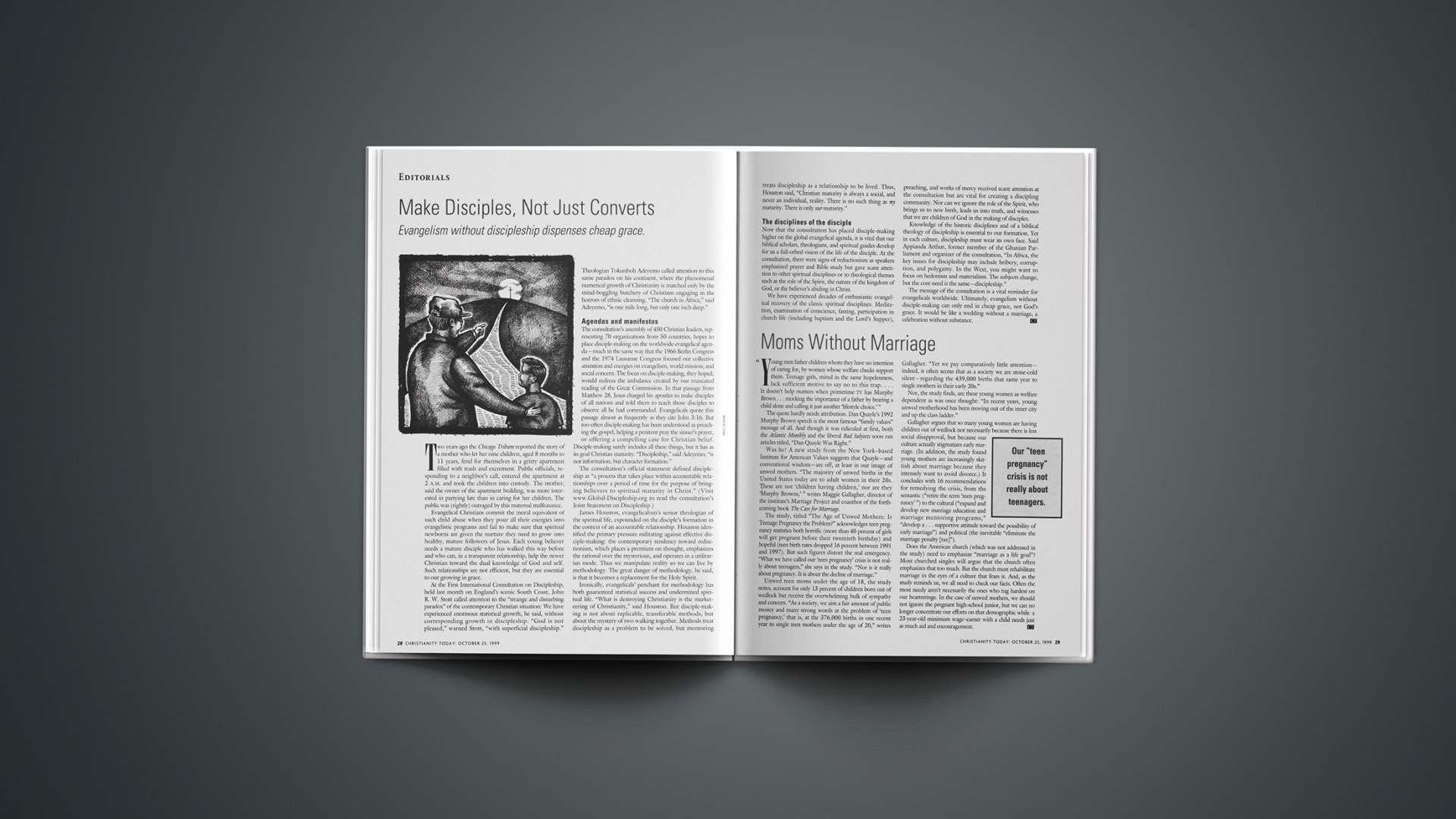“Young men father children whom they have no intention of caring for, by women whose welfare checks support them. Teenage girls, mired in the same hopelessness, lack sufficient motive to say no to this trap. … It doesn’t help matters when primetime TV has Murphy Brown … mocking the importance of a father by bearing a child alone and calling it just another ‘lifestyle choice.’ “
The quote hardly needs attribution. Dan Quayle’s 1992 Murphy Brown speech is the most famous “family values” message of all. And though it was ridiculed at first, both the Atlantic Monthly and the liberal Bad Subjects soon ran articles titled, “Dan Quayle Was Right.”
Was he? A new study from the New Yorkbased Institute for American Values suggests that Quayle—and conventional wisdom—are off, at least in our image of unwed mothers. “The majority of unwed births in the United States today are to adult women in their 20s. These are not ‘children having children,’ nor are they ‘Murphy Browns,’ ” writes Maggie Gallagher, director of the institute’s Marriage Project and coauthor of the forthcoming book The Case for Marriage.
The study, titled “The Age of Unwed Mothers: Is Teenage Pregnancy the Problem?” acknowledges teen pregnancy statistics both horrific (more than 40 percent of girls will get pregnant before their twentieth birthday) and hopeful (teen birth rates dropped 16 percent between 1991 and 1997). But such figures distort the real emergency. “What we have called our ‘teen pregnancy’ crisis is not really about teenagers,” she says in the study. “Nor is it really about pregnancy. It is about the decline of marriage.”
Unwed teen moms under the age of 18, the study notes, account for only 13 percent of children born out of wedlock but receive the overwhelming bulk of sympathy and concern. “As a society, we aim a fair amount of public money and many strong words at the problem of ‘teen pregnancy,’ that is, at the 376,000 births in one recent year to single teen mothers under the age of 20,” writes Gallagher. “Yet we pay comparatively little attention—indeed, it often seems that as a society we are stone-cold silent—regarding the 439,000 births that same year to single mothers in their early 20s.”
Our “teen pregnancy” crisis is not really about teenagers.
Nor, the study finds, are these young women as welfare dependent as was once thought: “In recent years, young unwed motherhood has been moving out of the inner city and up the class ladder.”
Gallagher argues that so many young women are having children out of wedlock not necessarily because there is less social disapproval, but because our culture actually stigmatizes early marriage. (In addition, the study found young mothers are increasingly skittish about marriage because they intensely want to avoid divorce.) It concludes with 16 recommendations for remedying the crisis, from the semantic (“retire the term ‘teen pregnancy’ “) to the cultural (“expand and develop new marriage education and marriage mentoring programs,” “develop a … supportive attitude toward the possibility of early marriage”) and political (the inevitable “eliminate the marriage penalty [tax]”).
Does the American church (which was not addressed in the study) need to emphasize “marriage as a life goal”? Most churched singles will argue that the church often emphasizes that too much. But the church must rehabilitate marriage in the eyes of a culture that fears it. And, as the study reminds us, we all need to check our facts. Often the most needy aren’t necessarily the ones who tug hardest on our heartstrings. In the case of unwed mothers, we should not ignore the pregnant high-school junior, but we can no longer concentrate our efforts on that demographic while a 23-year-old minimum wageearner with a child needs just as much aid and encouragement.
Copyright © 1999 Christianity Today. Click for reprint information.










